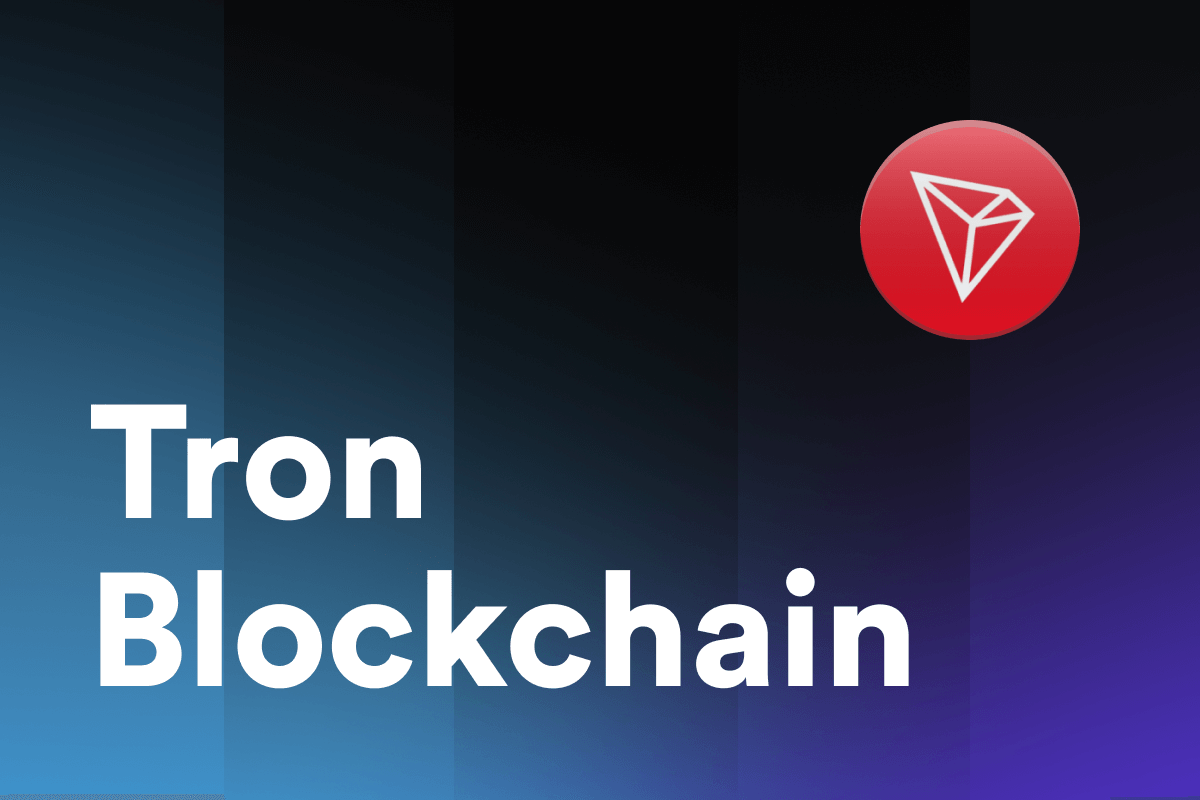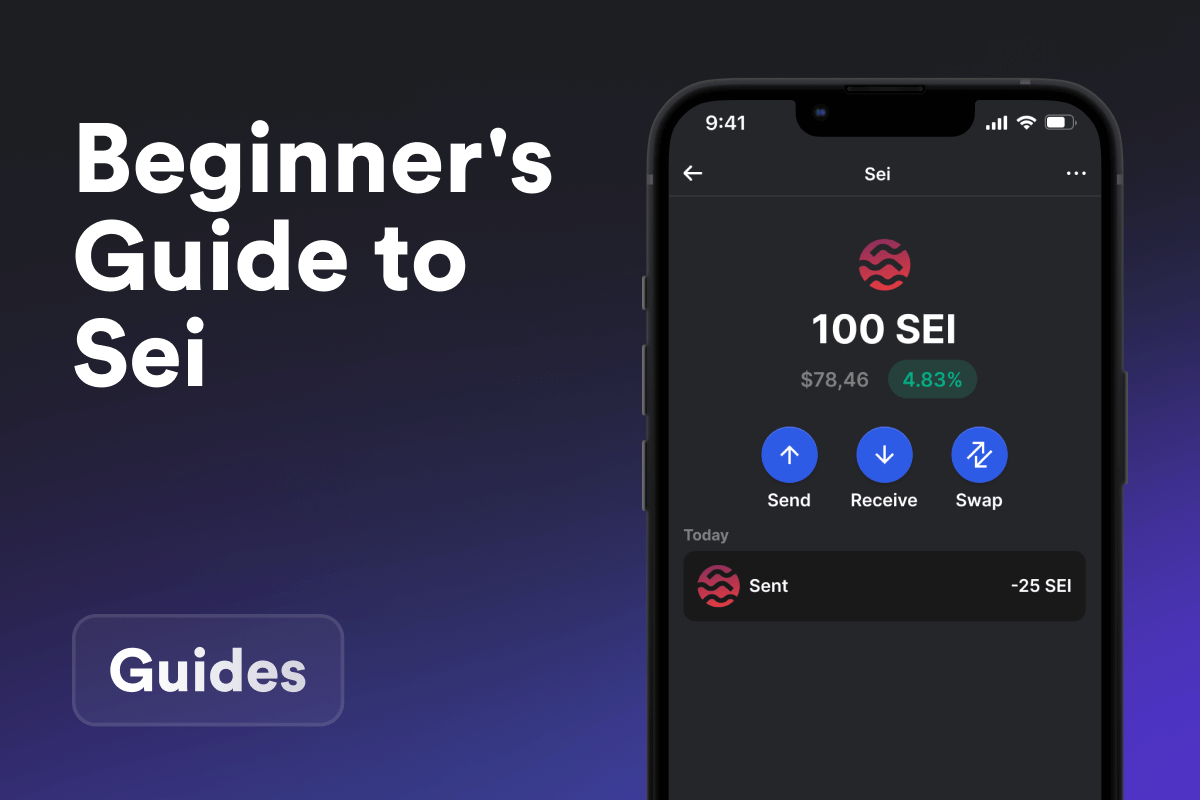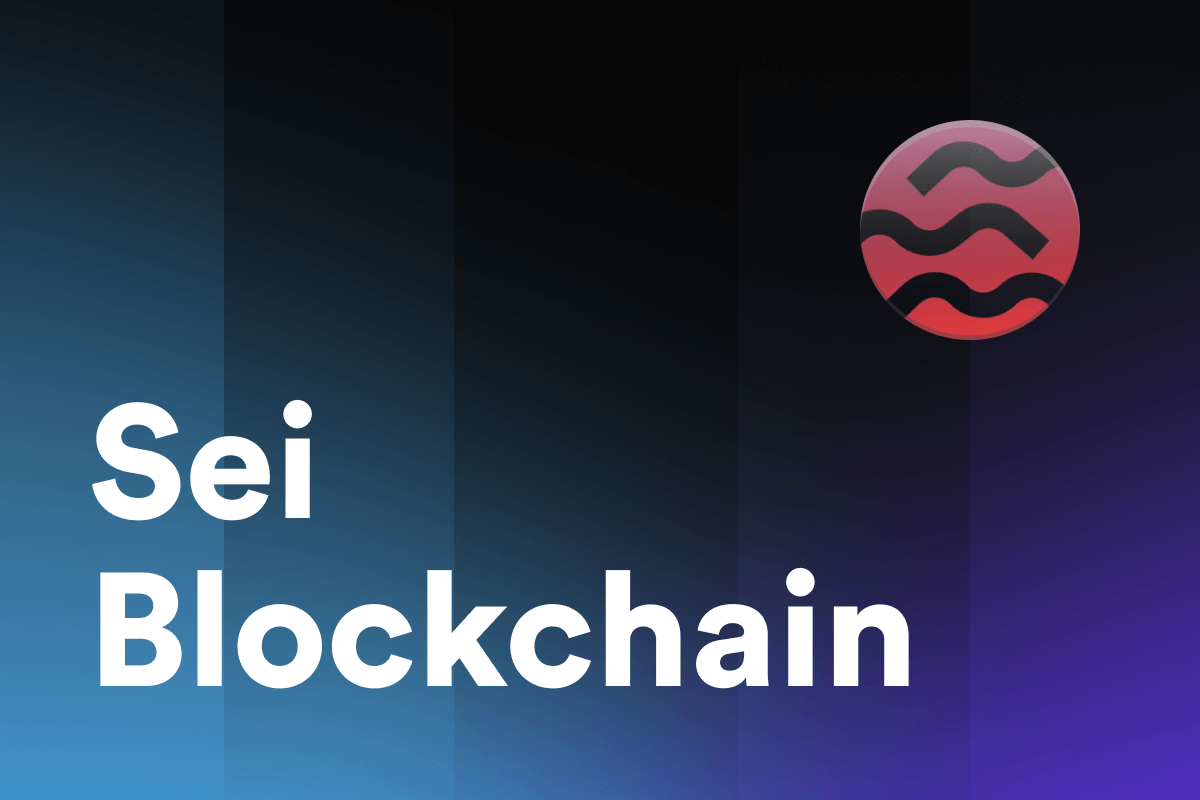
What Is Sei Blockchain?
Sei is a cutting-edge, general purpose, open-source Layer 1 blockchain, crafted specifically for digital asset exchange. Boasting a unique consensus mechanism and groundbreaking technical innovations, Sei stands as the fastest blockchain in the industry, redefining speed and efficiency. Contrary to popular belief, Sei is not just a DeFi chain. Its versatile design caters to a wide array of applications including gaming, social media platforms, and NFTs, offering a universal solution for digital asset trading. This general-purpose nature of Sei makes it an ideal platform for a diverse range of blockchain applications, setting a new standard in the blockchain world.
Differences Between Sei and Other Blockchains
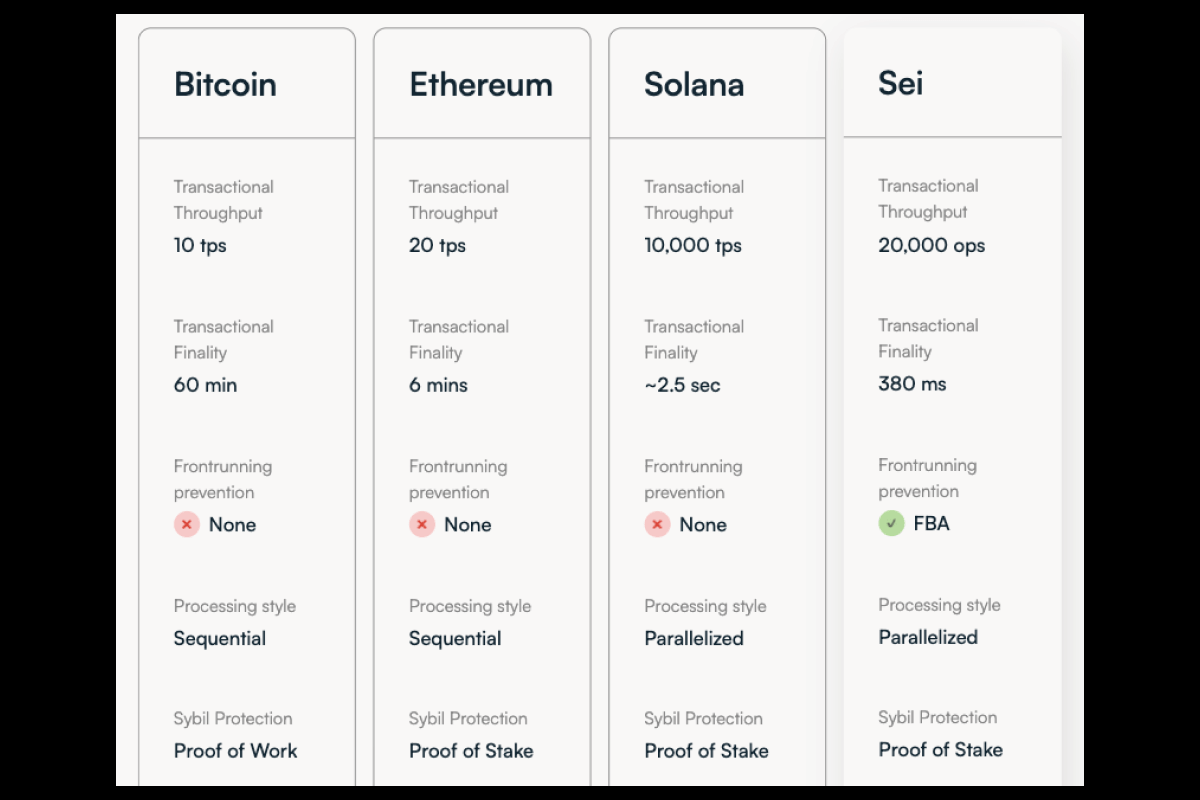 Sei vs other blockchains. Source: sei.io
Sei vs other blockchains. Source: sei.io
Speed and Transactional Finality
-
Sei boasts the fastest Time to Finality (TTF) in Web3, approximately 350 milliseconds.
-
Compared to other blockchains, this provides a more efficient transaction experience.
Scalability and Parallelization
-
Unique parallelization technique increases throughput and reduces latency.
-
Allows simultaneous processing of transactions that don’t affect the same state.
Frontrunning Protection
-
Implements measures to prevent frontrunning and Maximum Extractable Value (MEV) issues.
-
Uses techniques like frequent batch auctioning, enhancing security for financial applications.
Purpose-Built for DeFi and Trading
-
Optimized specifically for decentralized finance (DeFi) and trading applications.
-
Offers better support and performance for these types of applications.
IBC Interoperability and Developer-Friendly Ecosystem
-
Partners with Axelar Network for enhanced cross-chain messaging technology.
-
Designed with developers in mind, offering a shared liquidity hub for DeFi applications.
These features position Sei as a highly specialized and efficient Layer 1 blockchain, particularly suited for digital asset exchange and DeFi applications.
Sei Parallelization Technique: What Is It?
The Sei blockchain employs a unique parallelism approach to process transactions. This system allows the blockchain to handle multiple transactions simultaneously, significantly increasing its throughput. Unlike traditional blockchains that process transactions sequentially, Sei’s parallelism feature optimizes the use of resources, leading to faster transaction times and improved scalability. This method is especially beneficial for trading applications where high-speed transaction processing is crucial. Sei’s parallelism thus positions it as a highly efficient blockchain for decentralized finance and digital asset exchange applications.
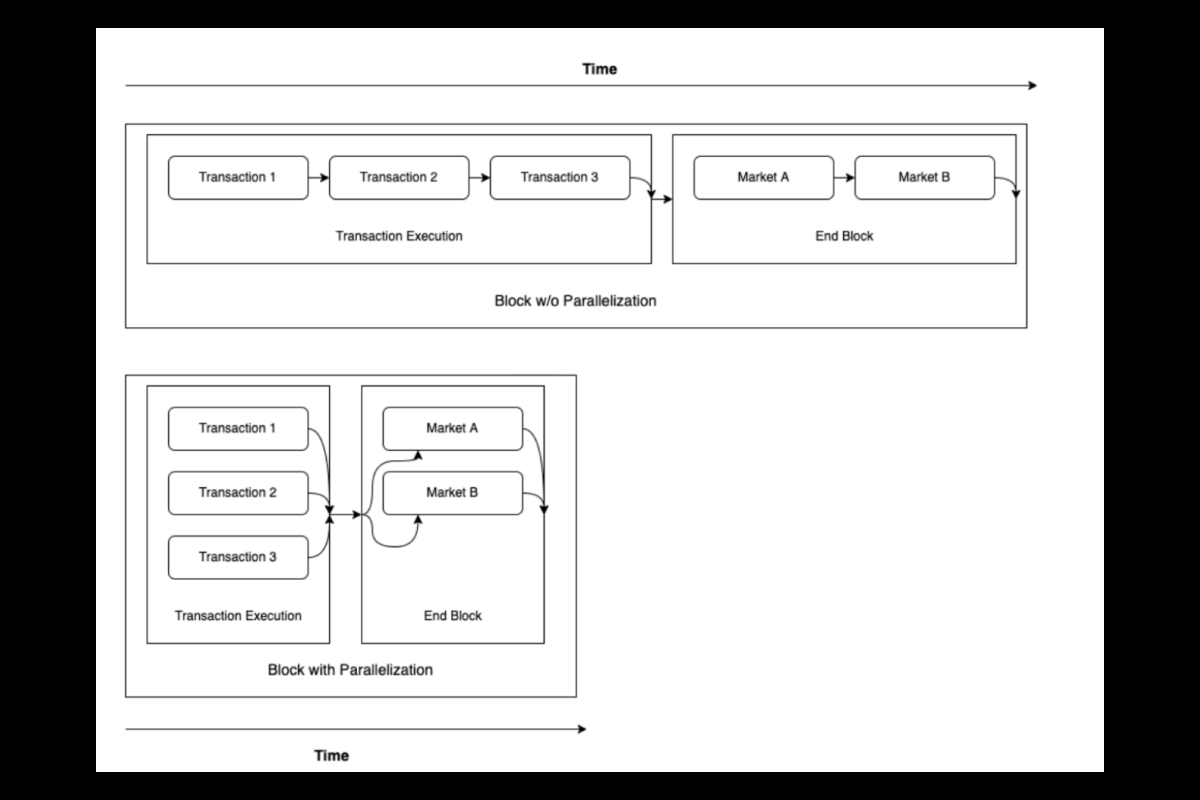 Block processing with and without parallelization. Source: Sei Whitepaper
Block processing with and without parallelization. Source: Sei Whitepaper
Key Technologies Inside the Sei Blockchain
Sei is a cutting-edge blockchain that continuously evolves, integrating the latest advancements in technology. Here’s a brief overview of some of the most notable technologies onboard the Sei blockchain:
Wormhole
This feature in the Sei blockchain acts as a bridge, allowing for the secure transfer of assets between Sei and other blockchains. When assets are transferred via Wormhole, they are initially locked in a smart contract on the source blockchain, and a corresponding Wormhole-wrapped asset is created on the target chain. This wrapped asset can then be exchanged for other assets on the target chain, facilitating seamless cross-chain transactions.
Axelar
Axelar functions as a connecting layer between different blockchains, providing a secure means for interchain communication and token transfers. When transferring assets through Axelar, the source assets are first deposited into a temporary address. The Axelar network then validates this deposit and ensures the transfer of funds to the intended recipient’s address on the selected blockchain.
These technologies play a pivotal role in expanding Sei’s reach and usability, enabling it to effectively communicate and transact across various blockchain platforms.
TokenFactory: The Standard for Tokens on the Sei Blockchain
The Sei blockchain facilitates the creation of tokens through its standard known as “TokenFactory.” This standard is designed for fungible tokens, which are interchangeable and identical, making them suitable for a wide range of digital assets. These assets can include, but are not limited to, voting rights, virtual currencies, or staking tokens. Furthermore, tokens created via TokenFactory are native sdk.Coins and come equipped with a range of built-in functionalities, enhancing their utility and integration within the Sei ecosystem. This token standard is pivotal in simplifying the process of token creation and management, making the Sei blockchain a versatile platform for various digital asset applications.
SEI: Blockchain’s Vital Force
To fully engage and participate in the Sei blockchain ecosystem, you will need SEI tokens. These tokens are essential for accessing and utilizing the various features and services within the Sei network.
Tokenomics of SEI
-
Total Supply: 10 billion tokens.
-
Founders’ Allocation: 9% of the total supply was allocated to the founders.
-
Team Allocation: 20% of the total supply was allocated to the team.
-
Ecosystem Allocation: 48% of the total supply was allocated to the ecosystem.
Uses of SEI
-
Transaction Fees: SEI tokens are essential for all transactions on the Sei blockchain. This includes transfers between wallets, moving tokens to exchanges, or engaging in other network activities. The use of SEI tokens facilitates efficient and speedy transaction processing on the Sei network.
-
Stake: The Sei blockchain utilizes SEI tokens for staking. Token holders can stake their SEI to engage in the network’s consensus process, enhancing network security and earning staking rewards. This staking mechanism is not just profitable for token holders but also plays a crucial role in maintaining the blockchain’s integrity and functionality.
-
NFT: SEI tokens are essential for various activities on the Sei blockchain, including the creation and trading of NFTs. They facilitate the minting of new NFT collections and enable the purchase of popular NFTs within the ecosystem.
-
Governance: SEI tokens are used for voting in the Sei blockchain. To initiate voting on a proposal, stakeholders can contribute SEI tokens during its deposit period. For example, a deposit might be specified as 10,000 SEI, ensuring active participation in governance.
-
Ecosystem: SEI can be used as native collateral or liquidity for applications, and also as transaction fees for exchanges operating within the Sei ecosystem.
